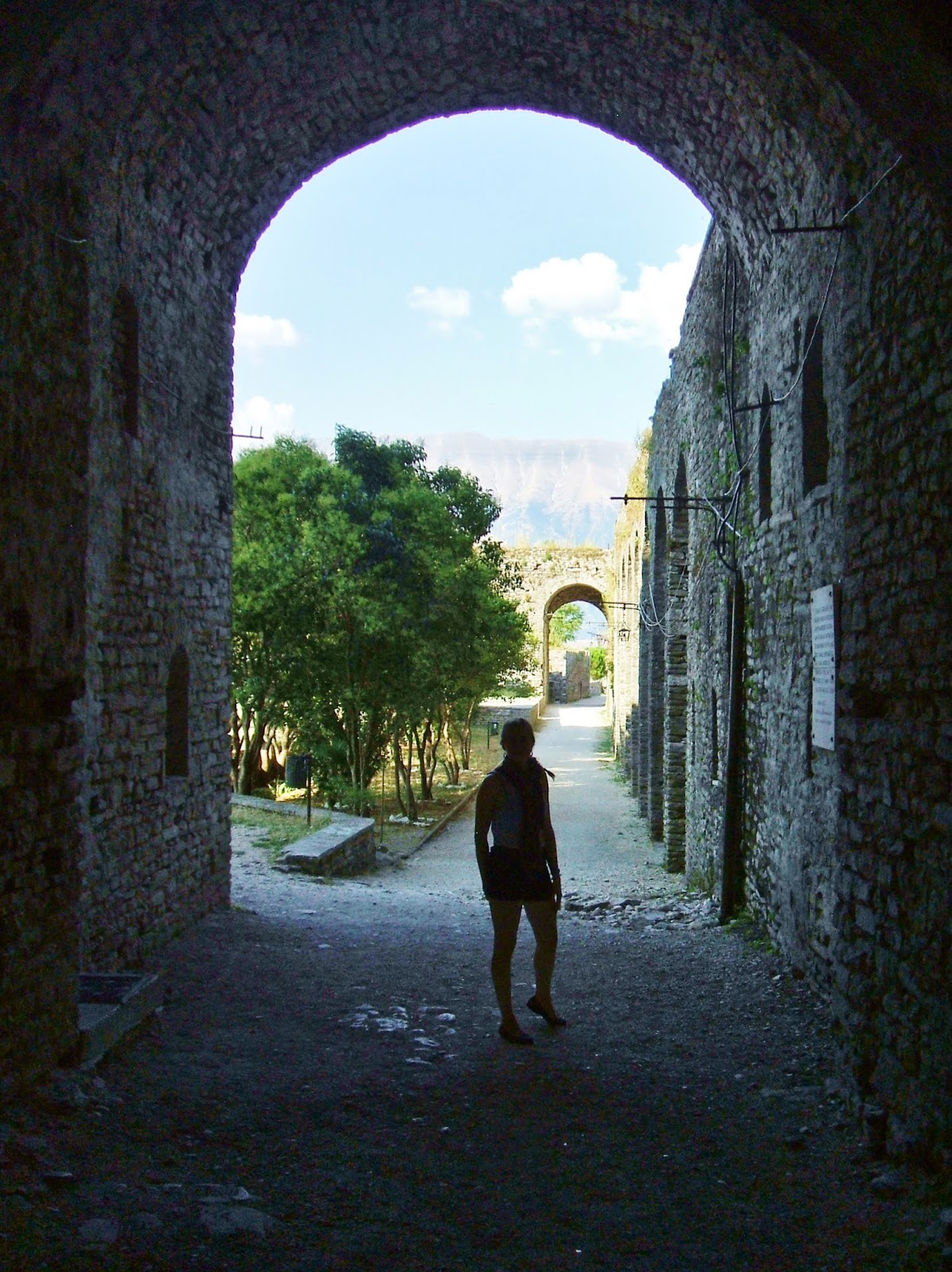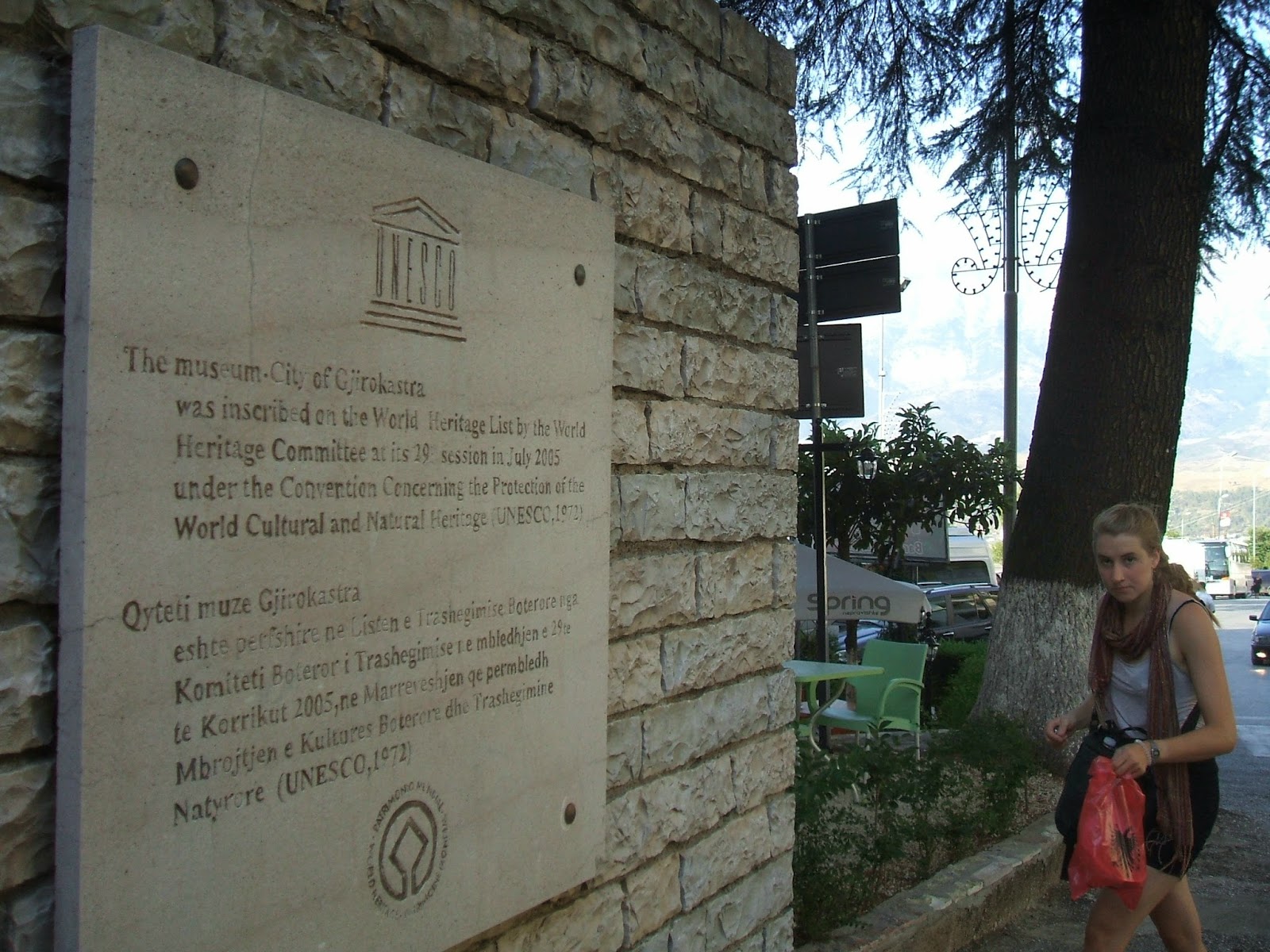“Who are you?” asked Shasta.
“Myself,” said the Voice, very deep and low so that the earth shook: and again “Myself,” loud and clear and gay: and then the third time “Myself,” whispered so softly you could hardly hear it, and yet it seemed to come from all around you as if the leaves rustled with it.”
― C.S. Lewis, The Horse and His Boy
I don't think there's anywhere I've ever traveled, besides maybe the village of Mestia up in northern Georgia, that felt quite as old and still and strange as Gjirokastër. It was like walking through a gate and coming out a few thousand years ago. Or maybe tens of thousands, if you look only at the mountains. There are, of course, also the new and soviet-looking parts of the city, as it is a proper city that rolls down the hills of the Gjerë mountains into the Drino river. It is the birthplace of the communist leader Enver Hoxha, whose strange legacy includes a lot of highs (rebuilding Albania after WWII, improving education, industry, and agriculture) and lows (700,000 hideous bunkers built to protect against invasion which still litter the countryside, breaking with both the USSR and Mao's China which led to international isolation, so many political prisoners and a cult of personality that even STALIN was like, "Dude, chill wit that.").
But before that: we had to find the damn place. Armed with Jo's GPS-equipped tablets and a much better conception of what the roads in Albania are like, we decided to take the main highway down. While most of the way it was calm enough, I will take a minute here to say that Albanian drivers are no different than any other Eastern European drivers I've experienced. They are crazy. I am not sure of the exact specifics of this statistic, but I think it's something like up until the early 90's there were only a few thousand cars in all of Albania. In '91 the government lifted the ban on private-car ownership and the amount of people who drive has been increasing ever since. But still, the dearth of car availability before that point and lack of development of driving safety shows when you get out on the highway.
Two lane highway, unmarked, on which cars going in our direction are occupying the entire road.
Passing in the middle of the road on a turn.
Again, no lanes indicated or observed. On a blind turn.
Things got hillier and hillier as we worked our way farther south and into the center of Albania, and our feelings on this lack of road etiquette got stronger, as you can probably imagine. Our rental was a pretty small Opel Corsa, although we'd requested a model that was bigger and slightly more powerful, this is what we had to work with. Which meant that our car was pretty slow going up a lot of these mountain passes (and once or twice, both entering and exiting Gjirokastër, and later making our way back up the coast, I sincerely doubted our car would be able to perform) so we got a lot of people passing us wildly or tailing us like a raging horde of jackasses. Bad driving behavior aside, the drive there was magnificent. The rolling hills grew into proper Balkan mountains and the land seemed to shift from valley to valley: now more austere, and desert-like, and then suddenly green and fresh-looking with fat, lazy mid-summer-brown rivers crawling through. It was a great drive. I was happy to let Jo do the whole thing, partly because we'd only insured her as the driver and partly because I had not driven the entire time I was living in Hungary and didn't feel inclined to rejoin the driving world among Albanian madmen.
Old town Gjirokastër, again the Ottoman style houses can be seen as well as.... other pieces of history. Some have given the city the nickname "City of Stone", because of the flat stones used for roofing on some of the houses. The city is actually considered a museum town now, which of course Hoxha made it during his time in power. It's a UNESCO World Heritage Site as well, I believe.
The castle of Gjirokastër is a lot of things. The building itself dates back to the 12th century and in the sections we explored we found cannons and other armaments going back to at least WWII. It also apparently has a marketplace (we arrived too late in the day for that), is host to a folk festival every 5 years, and has a few other museums inside.
Jo, contemplating our species' proclivity towards violence and the frailty of human life. Or letting the espresso we drank before climbing the hill up to the castle settle.
This. This gate. One minute, we were making inappropriate jokes about cannons and then we walked out into this courtyard and I couldn't remember what we were talking about anymore.
(There were still some leftover cannons strewn about, though.)
You can read the plaque below for the details, but the gist is this: in the '50s a US jet was forced to land in Albania because of some mechanical problems in the plane, and the Albanians assumed it was a spy plane and refused to give it back. They still haven't, obviously. This is a country that only outlawed the blood feud in the 20th century, after all.
I think the peculiar placement of this stage/altar platform thing and the stairs behind it contributed to the otherworldly feel of this place.
Albania, like all of the Eastern Bloc that got left behind, flies its EU aspirations.
A nice garden we stumbled through on our climb back down from the castle.
A stone-cutter's workshop, you can see some of his finest goat head and middle-finger carvings proudly displayed out front.
Jo, looking furtive.
Alas, Gjirokastër was not our final destination for the night. So it was we found ourselves driving at dusk back out towards the coast, on some roads we really wished we had a bit more daylight to see properly, as we made our way to Sarandë.
Encounters of the hircine kind.
The mountains receded back into hills, then bowed down altogether; the Adriatic and the coastal city of Sarandë unfolded before us. Driving through it was a nightmare of summertime vacationer traffic, tiny one-way streets, and too many cars for a city built when there were still almost none. But eventually we found the place we were looking for, a hostel that was really just an apartment in a high-rise on the beach, the only indication of its presence an Irish flag hanging from one of its water-facing balconies. The woman who ran it, a slightly manic but mostly friendly Irish lady, stuffed the place so full of people that every bunk in the three bedrooms (they were three high, with three or four per room) was full, people wrapped in sheets camped out on all the balconies and couches and finally, for a deep discount, simply sprawled out over the floor of the common room. Although the place was madness it was nice, after the hush and awe of Gjirokastër, to make some noise and be around people again. We raided a nearby supermarket, made ourselves some dinner and drank some good-enough Albanian wine, then sat on the balcony to listen to the whisper and roar of the Adriatic before passing out in our over-crowded, under-ventilated bedrooms.
It was a good day.
But not my best day in Albania.
That would be the next day, when we would finally make it to the destination we'd been talking about since we'd jumped on the train from Milan to Venice: Butrint.
The next morning we were up and out not long after sunrise. We had, after all, an archaeological treasure trove to explore, and a campsite to find.



















































Literally though. I must go to Albania.
ReplyDelete